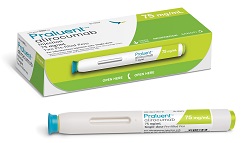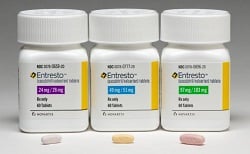 In noting Q4 sales of Sanofi ($SNY) and Regeneron's ($REGN) brand-new PCSK9 med Praluent--€5 million, a far cry from analyst estimates of €41 million or more--Bernstein analyst Tim Anderson said the big shortfall "is likely to bring scrutiny, as yet another example of slow uptake of a new medicine."
In noting Q4 sales of Sanofi ($SNY) and Regeneron's ($REGN) brand-new PCSK9 med Praluent--€5 million, a far cry from analyst estimates of €41 million or more--Bernstein analyst Tim Anderson said the big shortfall "is likely to bring scrutiny, as yet another example of slow uptake of a new medicine."
He was talking about Sanofi at the time. But he might have been talking about Big Pharma in general, because there are plenty of examples.
Over the past couple of weeks, as Big Pharma and Big Biotech unveiled their fourth-quarter earnings, some hotly anticipated new drugs proved slower out of the starting gate than many had predicted. Novartis, Amgen ($AMGN), Sanofi and Regeneron all found themselves explaining why, in spite of strong clinical data, their superstars-to-be had so far struggled to shine.
The answer, in all of those cases, was payers--specifically, payers and the hurdles they've erected to reimbursement, executives said.
 Novartis quoted $5 million on Entresto, the new heart failure drug it had trumpeted as a "megablockbuster" launch, perhaps the company's biggest ever. The drug brought in a paltry $35 million since its launch--far short of analyst estimates, and, Novartis admits, behind the company's own schedule.
Novartis quoted $5 million on Entresto, the new heart failure drug it had trumpeted as a "megablockbuster" launch, perhaps the company's biggest ever. The drug brought in a paltry $35 million since its launch--far short of analyst estimates, and, Novartis admits, behind the company's own schedule.
 |
| Novartis' David Epstein |
Medicare is the key problem here, Novartis ($NVS) Pharma chief David Epstein said during the company's fourth-quarter earnings call. Most Medicare plans, which cover 65% of potential Entresto patients, are taking the full six months allowed to evaluate a new product. Back in October, three months after Entresto's FDA approval, Novartis had "virtually no access for the brand" in Medicare, so even with a script in hand, "the patient was highly unlikely to have their insurance company pay for it," Epstein said.
Amgen has had a similar problem with scripts for its new PCSK9 cholesterol med Repatha. More than 80% of privately insured patients now have access to Repatha, the company said during its Q4 earnings call--but execs went on to point out that a majority of Repatha prescriptions are turned away at the pharmacy. Prior authorization requirements are getting in the way; not surprising, noted EVP Tony Hooper, when approval can require 5-page, handwritten forms.
"The utilization management criteria obviously differ plan by plan, but they include things such as a patient must have reached their maximally tolerated statin dose, or some require you to be on one or two statins," Hooper said. "Some of them require you to have done statins plus a step through to [Merck's] Zetia. … As we get the process running a bit more efficiently and hopefully moving from paper to an electronic process, the prior authorizations could go faster."
 |
| Amgen CEO Robert Bradway |
As for a sales score, Amgen didn't even reveal a hard number. The company isn't breaking Repatha's sales out yet, CEO Bob Bradway said during the fourth-quarter earnings call.
Sanofi, which might need a big-bang launch more than any of these companies, quoted its own access numbers--172 million covered lives, including 30 million under Medicare Part D. That's important, because a big chunk of patients likely to be eligible for Praluent are Medicare beneficiaries. Right now, most of the Praluent scripts are coming through the company's patient assistance and reimbursement bridge programs--which help patients get the drug even when their insurer hasn't made a deal--so they're not showing up in the script numbers from IMS Health often tracked by analysts.
"The majority of patients are in those programs," EVP Pascale Witz said during the call. "As we now have a good position on the coverage, we expect prescriptions will ramp up, and we will see an acceleration of prescriptions throughout the first quarter of this year." CEO Olivier Brandicourt chimed in, saying he expects solid Part D coverage by the end of Q1, and "a fair amount" of patients will soon be coming through channels where Sanofi has negotiated the best deals with payers.
Meanwhile, Novartis is counting on some new Medicare deals to kick in for Entresto, too. By the end of January, 70% of Medicare patients were expected to have some access; though many plans would require prior authorization, about two-thirds of patients with access will enjoy the lowest-tier copay, he said. On the private-pay side, almost 80% of plans are covering Entresto, with almost three-fourths of those patients on the low-tier level.
 Of course, prior authorization likely wouldn't be so tangled if Repatha and Praluent cost less. The latter two meds both carry list prices of more than $14,000, and they're coming into a market where most statin drugs have gone generic. And right now, PCSK9 rebates are pretty low at 15% to 20%, Bernstein analyst Ronny Gal wrote in an investor note, citing payers at a conference this week. Payers are managing costs by restricting access, and the prior authorization process "has been very effective in narrowing use," Gal said--as the two drugs' numbers show.
Of course, prior authorization likely wouldn't be so tangled if Repatha and Praluent cost less. The latter two meds both carry list prices of more than $14,000, and they're coming into a market where most statin drugs have gone generic. And right now, PCSK9 rebates are pretty low at 15% to 20%, Bernstein analyst Ronny Gal wrote in an investor note, citing payers at a conference this week. Payers are managing costs by restricting access, and the prior authorization process "has been very effective in narrowing use," Gal said--as the two drugs' numbers show.
The idea, on the payer side, is to wait for data from the Amgen and Sanofi/Regeneron outcomes studies, due this year and next. "If the outcome studies look good, they will loosen requirements for use and seek exclusive relationships," payers told Gal. "At that point, prices will come down."
Entresto's sticker price is $12.50 per pill, far more than those of older, off-patent heart failure meds, which cost pennies. But payers see the drug's $5,000-per-year list price as a good deal, both for patients and for the healthcare system, Gal reported from that payer conference.
If Novartis can get more insurers interested in performance-based deals for Entresto, that could help the two sides meet in the middle; just this week, the company has announced two, one with Cigna ($CI) and another with Aetna ($AET). Amgen made its own performance-based deal with Harvard Pilgrim on Repatha--with payments based on LDL goals and other stats. And once Amgen and the Sanofi/Regeneron team have their outcomes data in hand, they would all have more numbers to support performance deals.
Then again, those arrangements are even more complicated than the usual payer negotiations. Slow and steady might be the new reality for drugs launching into fields where cheap generics already rule, no matter how much better the next generation might be.